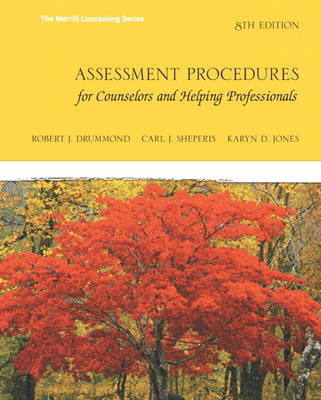
Assessment Procedures for Counselors and Helping Professionals
Pearson (Verlag)
978-0-13-285063-6 (ISBN)
- Titel ist leider vergriffen;
keine Neuauflage - Artikel merken
Dr. Robert Drummond passed away on March 14, 2005. He was a retired professor and counselor educator at the University of North Florida for 20 years. He was foremost in the field of assessment, and he specialized in educational and psychological testing, career development, models for evaluation, educational research, and personality theory and measurement. Dr. Drummond wrote the First Edition of this text in 1988. Now in its Eighth Edition, the book remains a popular assessment textbook in counseling. Dr. Carl J. Sheperis serves as Chair of the Department of Counseling and Special Populations at Lamar University. He is a Past-President of the Association for Assessment and Research in Counseling, Associate Editor for Quantitative Research for the Journal of Counseling and Development, and a Director for the National Board for Certified Counselors. Practice. In addition to this textbook Dr. Sheperis is an author of: Research in Counseling, Quantitative, Qualitative, and Mixed Methods, Clinical Mental Health Counseling: Fundamentals of Applied Practice, and The Peace Train. He is also published in various textbooks, academic journals, and reference volumes. A frequent speaker and presenter at professional conferences and workshops, as well, Carl Sheperis has appeared at such recent events as the American Counseling Association World Conference, the Association for Counselor Education and Supervision Conference, the National Assessment Conference, and the National Head Start Conference. Dr. Karyn Dayle Jones is an associate professor in counselor education at the University of Central Florida. She has 20 years of experience in the counseling profession and has been a counselor educator for 14 years. Jones is coauthor of Introduction to the Profession of Counseling, has authored or coauthored several book chapters and refereed publications, and has made numerous professional presentations in the field of counseling and counselor education. Her primary areas of research are assessment and diagnosis. She is the past president of the Counseling Association for Humanistic Counseling, Education and Development, a division of the American Counseling Association. Jones is a Florida Licensed Mental Health Counselor, and a National Certified Counselor, and she has worked as a counselor in mental health agencies, schools, and private practice.
BRIEF TABLE OF CONTENTS PART ONE Principles and Foundations of Psychological and Educational Assessment Chapter 1 Introduction to Assessment 1 Chapter 2 Methods and Sources of Assessment Information 20 Chapter 3 Statistical Concepts 46 Chapter 4 Understanding Assessment Scores 70 Chapter 5 Reliability/Precision 91 Chapter 6 Validity 110 Chapter 7 Selecting, Administering, Scoring, and Interpreting Assessment Results 130
PART TWO Overview of Assessment AreasChapter 8 Assessment of Intelligence and General Ability 158 Chapter 9 Assessment of Achievement 195 Chapter 10 Assessment of Aptitude 223 Chapter 11 Career and Employment Assessment 243 Chapter 12 Personality Assessment 271
PART THREE Applications and Issues Related to Assessment Chapter 13 Clinical Assessment 303 Chapter 14 Assessment in Education 332 Chapter 15 Assessment Issues with Diverse Populations 356 Chapter 16 Communicating Assessment Results 375 Chapter 17 Ethical and Legal Issues in Assessment 395 DETAILED TABLE OF CONTENTS PART ONE Principles and Foundations of Psychological and Educational Assessment
Chapter 1 Introduction to Assessment 1
What Is Assessment? 2
The Purposes of Assessment 3
Multiple Methods and Multiple Sources 5
The Assessment Process 7
Competencies Required for Assessment 9
Historical Perspectives 11
Assessment and Technology 15
Computer-based Assessment 15
Internet-based Assessment 16
Controversial Issues in Assessment 17
Summary 17 • Moving Forward 18 • Questions for Discussion 18 • Suggested Activities 18 • Reference 18
Chapter 2 Methods and Sources of Assessment Information 20
Assessment Methods and Sources 20
Formal and Informal Assessment Instruments and Strategies 22
The Initial Interview 23
Degrees of Structure Interviews 24
Interview Guidelines 26
Tests 27
Categories of Tests 29
Observation 34
Formal and Informal Observation 35
Direct and Indirect Observation 35
Natural and Contrived Settings 36
Unobtrusive and Participant Observation 36
Methods of Recording Observations 36
Self-monitoring 41
Collateral Sources 41
Summary 43 • Questions for Discussion 43 • Suggested Activities 43 • References 44
Chapter 3 Statistical Concepts 46
Statistical Concepts for Assessment 46
Scales of Measurement 48
Nominal Scale 48
Ordinal Scale 49
Interval Scale 49
Ratio Scale 50
Describing Scores 50
Frequency Distributions 50
Measures of Central Tendency 55
Measures of Variability 57
The Normal Curve 60
Measures of Relationship 61
Summary 68 • Questions for Discussion 68 • Suggested Activities 68 • References 69
Chapter 4 Understanding Assessment Scores 70
Assessment Scores 70
Criterion-Referenced Scores 71
Norm-Referenced Scores 72
Norm Group 73
Types of Norm-Referenced Scores 75
Qualitative Assessment 84
Tables and Profiles 85
Norm-Referenced, Criterion-Referenced, or Both? 87
Summary 89 • Questions for Discussion 89 • Suggested Activities 89 • References 90
Chapter 5 Reliability/Precision 91
Reliability 92
Measurement Error 93
Sources of Measurement Error 93
Methods of Estimating Reliability/Precision 95
Test-Retest 97
Alternate Form 98
Internal Consistency Reliability 99
Interrater Reliability 102
Selecting a Reliability Coefficient 103
Evaluating Reliability Coefficients 103
Standard Error of Measurement 104
Confidence Intervals 106
Increasing reliability/precision 107
Summary 108 • Questions for Discussion 108 • Suggested Activities 108 • References 109
Chapter 6 Validity 110
The Nature of Validity 111
Revisiting Construct 112
Threats to Validity 112
Validity and Reliability/Precision 113
Sources of Validity Evidence 114
Test Content Validity Evidence 114
Evidence Based on Internal Structure 116
Relations to Other Variables Evidence 118
Evidence of Homogeneity 121
Convergent and Discriminant Evidence 121
Evidence Based On Consequences of Testing 125
Evidence Based on Response Processes 126
Summary 126 • Questions for Discussion 127 • Suggested Activities 127 • References 128
Chapter 7 Selecting, Administering, Scoring, and Interpreting Assessment Results 130
Selecting Assessment Instruments and Strategies 130
Identify the Type of Information Needed 131
Identify Available Information 131
Determine the Methods for Obtaining Information 131
Search Assessment Resources 133
Evaluate and Select an Assessment Instrument or Strategy 137
Administering Assessment Instruments 145
Before Administration 147
During Administration 148
After Administration 151
Scoring Assessment Instruments 151
Scoring Performance Assessment 152
Scoring Errors 153
Standards for Scoring Assessment Instruments 153
Interpreting Assessment Results 154
Summary 155 • Questions for Discussion 156 • Suggested Activities 156 • References 157
PART TWO Overview of Assessment Areas
Chapter 8 Assessment of Intelligence and General Ability 158
Defining Intelligence 158
Theories of Intelligence 160
Spearman's Two-Factor Theory 161
Thurstone’s Multifactor Theory 162
Vernon's Hierarchical Model 163
Catell-Horn GF-GC Theory 164
Guilford's Structure-of-Intellect Model 164
Plaget's Theory of Cognitive Development 165
Luria's Model 166
Sternberg's Triarchic Theory of Successful Intelligence 166
Gardner's Theory of Multiple Intelligences 167
Carroll's Three-Stratum Model of Human Abilities 167
Planning-Attention-Simultaneous-Successive Theory of Cognitive Processing 168
Catell-Horn-Carroll Hierarchical Three-Stratum Model 168
Intelligence Tests 170
Ability, Intelligence, Achievement, and Aptitude 172
Individual Intelligence Tests 172
Group Intelligence Tests 185
Specialized Tests 187
Interviews and Observations 188
Issues in Assessing Intelligence 189
Summary 191 • Questions for Discussion 191 • Suggested Activities 191 • References 192
Chapter 9 Assessment of Achievement 195
Assessing Achievement 195
Standardized Achievement Tests 196
Achievement Test Batteries 197
Individual Achievement Tests 202
Diagnostic Tests 205
Subject-Area Tests 210
Adult Achievement Tests 211
Other Types of Achievement Assessment Instruments 211
Criterion-Referenced Tests and Minimum-Level Skills Tests 211
State Achievement Tests 213
National Assessment of Educational Progress 213
Curriculum-Based Assessment and Curriculum-Based Measurement 214
Performance Assessment 214
Portfolio Assessment 215
Factors Affecting Student Achievement 215
Analysis of Class Profile 217
Summary 221 • Questions for Discussion 221 • Suggested Activities 222 • References 222
Chapter 10 Assessment of Aptitude 223
Aptitude Tests 223
Multiple-Aptitude Test Batteries 224
Specialized Aptitude Tests 230
Admissions Tests 235
Readiness Tests 239
Summary 240 • Questions for Discussion 240 • Suggested Activities 211 • References 211
Chapter 11 Career and Employment Assessment 243
Career Assessment 243
Interest Inventories 244
Work Values Inventories 250
Personality Inventories 252
Abilities and Skills Assessment 253
Career Development Inventories 256
Combined Assessment Programs 257
Interviews 257
Employment Assessment 258
Selection Interviews 258
Biographical Information 259
Tests 260
Job Analysis 262
Assessment Centers 265
Guidelines for Employee Selection 266
Trends In Employment Assessment 266
Summary 267 • Questions for Discussion 268 • Suggested Activities 268 • Reference 269
Chapter 12 Personality Assessment 271
Defining Personality 271
Traits, States, and Types 272
Personality Inventories 274
Approaches To Personality Inventory Development 274
Categories of Personality Inventories 276
Structured Personality Inventories 276
Projective Instruments and Techniques 285
Personality Inventories with a Positive Focus 294
Response Styles 297
Summary 298 • Questions for Discussion 298 • Suggested Activities 299 • Reference 300
PART THREE Applications and Issues Related to Assessment
Chapter 13 Clinical Assessment 303
Fundamentals of Clinical Assessment 303
Political Issues in Diagnosis 304
Determining a Diagnosis 304
Dsm-5 305
Interviews in Clinical Assessment 308
Mental Status Exam 310
Instruments Used in Clinical Assessment 311
Suicide Risk Assessment 317
Observation and Clinical Assessment 319
Neuropsychological Assessment 326
Cultural Considerations in Clinical Assessment 329
Summary 329 • Questions for Discussion 330 • Suggested Activities 330 • References 330
Chapter 14 Assessment in Education 332
School Assessment Programs 333
Planning a School Assessment Program 333
Instruments Used in School Assessment Programs 334
Assessment Activities of School Counselors 336
Needs Assessments 337
Assessing Specific Learning Disabilities 337
Assessing Giftedness 340
Consulting with Teachers 346
Environmental Assessment in the Schools 346
Competencies in Assessment and Evaluation for School Counselors 347
Assessment Issues in Education 348
Test Preparation and Performance 349
Coaching 350
Test-Wiseness 350
Test Anxiety 351
Summary 352 • Questions for Discussion 353 • Suggested Activities 353 • References 353
Chapter 15 Assessment Issues with Diverse Populations 356
Multicultural Assessment 357
Measurement Bias 357
Multicultural Perspectives In Assessment 360
Acculturation 361
Strategies 361
Assessment Of Linguistically Diverse Individuals 361
Assessment of Individuals with Disabilities 363
Assessment of Individuals with Visual Impairment 365
Assessment of Individuals with Hearing Impairment 366
Assessment of Individuals with Intellectual Disability 367
Assessment of Individuals with Neuropsychological Impairment 369 Assessment of Individuals with Communication Disorders 369
Assessment of Children with Disabilities 369
Standards for Assessment with Diverse Populations 372
Summary 372 • Questions for Discussion 373 • Suggested Activities 373 • References 373
Chapter 16 Communicating Assessment Results 375
Feedback Sessions 376
Group Feedback Sessions 378
Problem Areas 378
Feedback Sessions With Parents 381
Assessment Reports 383
Qualities of Well-Written Reports 384
The Assessment Report Format 385
Communicating Assessment Results to Other Professionals 390
Communicating Assessment Results to the Public 390
Summary 392 • Questions for Discussion 392 • Suggested Activities 392 • References 393
Chapter 17 Ethical and legal Issues in Assessment 395
Professional Standards and Codes of Ethics 395
American Counseling Association Code of Ethics 396
AERA, APA, and NCME Standards For Educational and Psychological Testing 396
American Psychological Association Ethical Principles of Psychologists and Code of Conduct 398
Association For Assessment And Research in Counseling Responsibilities of Users of Standardized Tests, Third Edition 399
Joint Committee on Testing Practices Code Of Fair Testing Practices In Education 399
National Council On Measurement in Education Code of Professional Responsibilities in Educational Measurement 400
Ethical Issues in Assessment 400
Professional Training and Competence 400
Test-User Qualifications 402
Client Welfare Issues 404
Legal Issues in Assessment 404
Statutes and Regulations 405
Judicial Decisions 408
Summary 410 • Questions for Discussion 410 • Suggested Activities 410 • References 411
Appendix I Standards for Multicultural Assessment Fourth Revision, 2012 412
Appendix II Responsibilities of Users of Standardized Tests (RUST; 3rd ed.) 417
Name Index 422
| Erscheint lt. Verlag | 29.9.2015 |
|---|---|
| Sprache | englisch |
| Maße | 193 x 240 mm |
| Gewicht | 830 g |
| Themenwelt | Kinder- / Jugendbuch ► Sachbücher |
| Geisteswissenschaften ► Psychologie ► Klinische Psychologie | |
| Geisteswissenschaften ► Psychologie ► Test in der Psychologie | |
| Sozialwissenschaften ► Pädagogik ► Sozialpädagogik | |
| Sozialwissenschaften ► Soziologie | |
| ISBN-10 | 0-13-285063-X / 013285063X |
| ISBN-13 | 978-0-13-285063-6 / 9780132850636 |
| Zustand | Neuware |
| Informationen gemäß Produktsicherheitsverordnung (GPSR) | |
| Haben Sie eine Frage zum Produkt? |
aus dem Bereich


